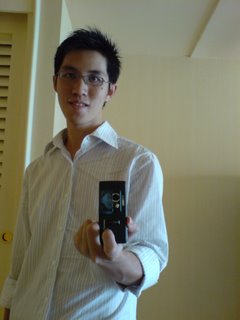
If you've been to Central, you would already have seen the Japanese floor - the one with Waraku, Tom Ton, Kyomomoyama, and also the upcoming Sun with Moon. One huge row of Japanese restaurants.
So I was eating in a large group at Kyomomoyama. First time into the place, which has a rather unimposing facade. The interior is done in an understated style that reminds me of Tatsuya.. see the central displays with the huge bottles of Sake?

The dishes are expensive though - the set lunches range from $12 to almost $30, and the individual dishes (other than the sobas and udons, which cost about $9) are generally in the $20+ range.

Some of my colleagues' set lunches - this is the tori karaage...

and the pacific saury. It looks really interesting, no? There was also a tonkatsu dish which tasted okay, but not spectacular.
For myself, I ordered a non-set dish. Normally the first dish I try is tonkatsu, but it just seemed kind of boring, know what I mean? So I ordered a hitsumabushi - grilled eel and egg ($21+++).

Not a complimentary picture, heh. The grilled eel tasted quite good, and the rice was fine. But the best part of the dish was the egg! It was just fantastic - a little bit juicy, and a little bit sweet, and a whole lot of tasty and delectable. It was cooked into this ultra-thin, delicate layer spread evenly all over the rice, and from my first bite I was pretty much hooked. I don't know if the dish was worth $20, but it was darn good!
(Note though: this dish comes with soup and chawanmushi, but the chawanmushi did not taste very good at all. Kind of stale tasting and powdery, somehow)
Overall, quite a nice place to eat, but pricey! Not as bad as Tatsuya though, definitely.




